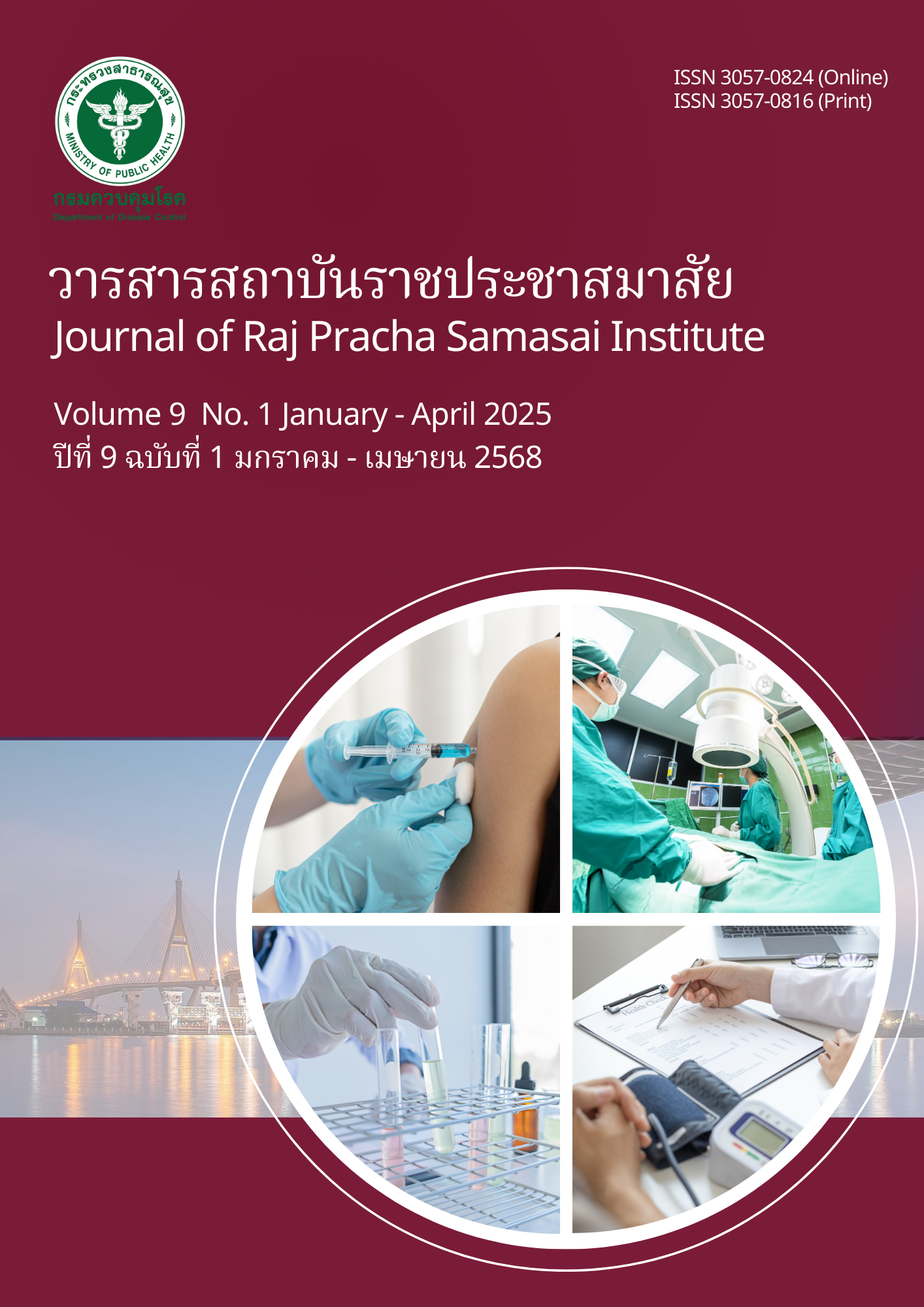Development of a Digital Platform to Support Leprosy Elimination Efforts in Thailand
Main Article Content
Abstract
Leprosy remains a significant public health issue in Thailand despite a declining trend in cases. Challenges such as delayed case reporting, lack of standardization, unclear communication, and technical limitations hinder effective disease monitoring and control, impacting global efforts toward eradication. In alignment with the WHO’s Zero Leprosy policy, this study analyzes innovative approaches for eliminating leprosy in Thailand.
A 10-year retrospective review (2015 - 2024) was conducted using research databases including PubMed and Google Scholar. Articles were selected based on keywords related to digital platforms, AI, GIS, and chatbots to develop and assess the feasibility of technology-driven solutions supporting the Zero Leprosy initiative. Results revealed substantial research on leprosy, with 7,528 articles on PubMed, 9,282 on ScienceDirect, and 84,900 on Google Scholar. AI applications for leprosy screening numbered 202, 307, and 17,800 articles, respectively, while GIS-related research included 11, 62, and 5,170 articles. Studies on chatbots or mobile applications numbered 59, 155, and 9,220 articles across these platforms.
The study proposes a Digital Platform concept to enhance leprosy elimination efforts in Thailand. AI improves diagnostic accuracy, patient follow-up, and information dissemination in remote areas, reducing treatment delays, enhancing diagnostic precision, and minimizing disability risks. GIS technology enables tracking treatment coverage, monitoring disease spread, and linking agencies through patient travel data and timelines for effective outbreak control. Lastly, chatbots or mobile applications provide 24/7 information on leprosy prevention and treatment, answer FAQs, and store conversation data to refine communication strategies and patient care. Therefore, these innovations have the potential to drive leprosy elimination in Thailand under the WHO's Zero Leprosy policy.
Downloads
Article Details

This work is licensed under a Creative Commons Attribution-NonCommercial-NoDerivatives 4.0 International License.
ประกาศเกี่ยวกับลิขสิทธิ์
บทความที่ลงพิมพ์ในวารสารสถาบันราชประชาสมาสัย ถือว่าเป็นผลงานทางวิชาการหรือการวิจัย และวิเคราะห์ตลอดจนเป็นความเห็นส่วนตัวของผู้นิพนธ์ ไม่ใช่ความเห็นของกรมควบคุมโรค ประเทศไทย หรือกองบรรณาธิการแต่ประการใด ผู้นิพนธ์จำต้องรับผิดชอบต่อบทความของตน
นโยบายส่วนบุคคล
ชื่อและที่อยู่อีเมลที่ระบุในวารสารสถาบันราชประชาสมาสัย จะถูกใช้เพื่อวัตถุประสงค์ตามที่ระบุไว้ ในวารสารเท่านั้น และจะไม่ถูกนำไปใช้สำหรับวัตถุประสงค์อื่น หรือต่อบุคคลอื่นใด
References
Department of Disease Control (TH), Rajpracha Samasai Institute. Annual Report 2023. Samut Prakan: Rajpracha Samasai Institute; 2023.
Mahotarn K, Bumpenyu S, Setkit C et al. Handbook of Leprosy Diagnosis and Treatment. 2nd ed. Bangkok: Cooperative League of Thailand; 2001.
World Health Organization. Leprosy Road Map: Strategies for Interrupting Transmission and Achieving Zero New Infections. Geneva: World Health Organization; 2021.
Mahidol University. Development of an intelligent information technology system for epidemic situations in Thailand (Thailand Epidemic AI) [Internet]. Bangkok: Mahidol University; 2024 [cited 2024 Nov 26]. Available from: https://www.mahidol.ac.th
World Health Organization. Guidelines for the diagnosis, treatment, and prevention of leprosy [Internet]. New Delhi. WHO Regional Office for South-East Asia; 2018. [Cited 2018 Oct 6] Available from: https://www.who.int/publications/i/item/97892902263830.
Bangkokbiznews. Exploring the future of public health systems: AI and innovation supporting services [Internet]. Bangkok. Bangkokbiznews; 2024 [cited 2024 Nov 26]. 1 p. Available from: https://www.bangkokbiznews.com
Zealous System. Chatbots in healthcare: enhancing patient care and operational efficiency [Internet]. Zealous system; 2024 [cited 2024 Dec 19]. Available from: https://www.zealousys.com/blog/chatbots-in-healthcare
Inferenz. Chatbot for healthcare: Key use cases, benefits & risks of AI [Internet]. Inferenz; 2023 [cited 2024 Dec 19]. Available from: https://inferenz.ai/resources/blogs/artificial-intelligence/chatbot-for-healthcare-key-use-cases-benefits-risks-of-ai/
Patel A, Waters N. Using Geographic Information Systems for Health Research [Internet]. Application of Geographic Information Systems. InTech. 2012;303-320. doi: 10.5772/47941
Robin TA, Khan MA, Kabir N, Rahaman SkT, Karim A, Mannan II, et al. Using spatial analysis and GIS to improve planning and resource allocation in a rural district of Bangladesh. BMJ Glob Health. 2019;4:e000832. doi:10.1136/bmjgh-2018-000832
Sharma R, Reddy JV. Application of GIS in Monitoring and Evaluation of Rural Development Programs in India. International Journal of Geomatics and Geosciences. 2018;8(2):123-130.


